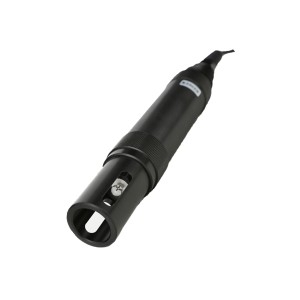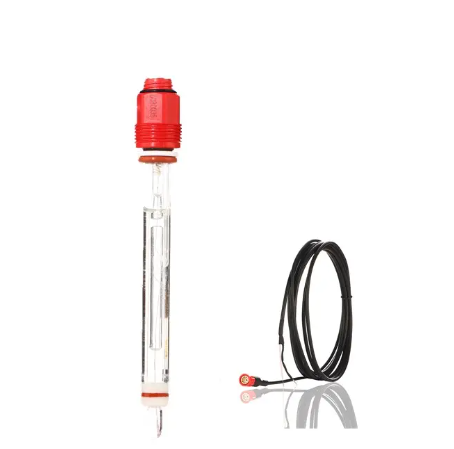What is a ph probe? Some people may know the basics of it, but not how it works. Or someone knows what is a ph probe, but is not clear about how to calibrate and maintain it.
This blog lists all the content that you may care about so that you can understand more: basic information, working principles, application, and calibration maintenance.
What Is A pH Probe? – Section On Introduction To Basic Information
What is a ph probe? A pH probe is a device used to measure the pH of a solution. It typically consists of a glass electrode and a reference electrode, which work together to measure the hydrogen ion concentration in a solution.
How accurate is a pH probe?
The accuracy of a pH probe depends on several factors, including the quality of the probe, the calibration process, and the conditions of the solution being measured. Typically, a pH probe has an accuracy of +/- 0.01 pH units.
For example, the accuracy of BOQU’s latest technology IoT Digital pH Sensor BH-485-PH is ORP: ±0.1mv, Temperature: ±0.5°C. Not only is it highly accurate, but it also has a built-in temperature sensor for instant temperature compensation.
What factors can affect the accuracy of a pH probe?
Several factors can affect the accuracy of a pH probe, including temperature, electrode aging, contamination, and calibration error. It is important to control these factors to ensure accurate and reliable pH measurements.
What Is A pH Probe? – Section On How It Works
A pH probe works by measuring the voltage difference between the glass electrode and the reference electrode, which is proportional to the hydrogen ion concentration in the solution. The pH probe converts this voltage difference into a pH reading.
What is the pH range that a pH probe can measure?
Most pH probes have a pH range of 0-14, which covers the entire pH scale. However, some specialized probes may have a narrower range depending on their intended use.
How often should a pH probe be replaced?
The lifespan of a pH probe depends on several factors, including the quality of the probe, the frequency of use, and the conditions of the solutions being measured.
Generally, a pH probe should be replaced every 1-2 years, or when it begins to show signs of wear or damage. If you don’t know this information, you can ask some professional personnel, such as BOQU’s customer service team—— They have a lot of experience.
What Is A pH Probe? – Section On Applications
A pH probe can be used in most aqueous solutions, including water, acids, bases, and biological fluids. However, certain solutions, such as strong acids or bases, can damage or degrade the probe over time.
What are some common applications of a pH probe?
A pH probe is used in many scientific and industrial applications, including environmental monitoring, water treatment, food and beverage production, pharmaceuticals, and chemical manufacturing.
Can a pH probe be used in high-temperature solutions?
Some pH probes are designed for use in high-temperature solutions, while others may become damaged or degraded at high temperatures. It is important to choose a pH probe that is appropriate for the temperature range of the solution being measured.
For example, BOQU’s High-temperature S8 Connector PH Sensor PH5806-S8 can detect a temperature range of 0-130°C. It can also withstand the pressure of 0~6 Bar and withstand high-temperature sterilization. It is a good choice for industries such as pharmaceuticals, bioengineering, and beer.
Can a pH probe be used to measure the pH of a gas?
A pH probe is designed to measure the pH of a liquid solution, and cannot be used to measure the pH of a gas directly. However, a gas can be dissolved in a liquid to create a solution, which can then be measured using a pH probe.
Can a pH probe be used to measure the pH of a non-aqueous solution?
Most pH probes are designed to measure the pH of an aqueous solution, and may not be accurate in non-aqueous solutions. However, specialized probes are available for measuring the pH of non-aqueous solutions, such as oils and solvents.
What Is A pH Probe? – Section On Calibration And Maintenance
How do you calibrate a pH probe?
To calibrate a pH probe, you need to use a buffer solution with a known pH value. The pH probe is immersed in the buffer solution, and the reading is compared to the known pH value. If the reading is not accurate, the pH probe can be adjusted until it matches the known pH value.
How do you clean a pH probe?
To clean a pH probe, it should be rinsed with distilled water after each use to remove any residual solution. If the probe becomes contaminated, it can be soaked in a cleaning solution, such as a mixture of water and vinegar or water and ethanol.
How should a pH probe be stored?
A pH probe should be stored in a clean, dry place, and should be protected from extreme temperatures and physical damage. It is also important to store the probe in a storage solution or a buffer solution to prevent the electrode from drying out.
Can a pH probe be repaired if it becomes damaged?
In some cases, a damaged pH probe can be repaired by replacing the electrode or the reference solution. However, it is often more cost-effective to replace the entire probe rather than attempt to repair it.
Final words:
Do you now know what is a ph probe? The basic information, working principle, application, and maintenance of the ph probe have been introduced in detail above. Among them, a very high-quality industrial-grade IoT Digital pH Sensor is also introduced to you.
If you want to get this high-quality sensor, just ask BOQU’s customer service team. They are very good at providing perfect solutions for customer service.
Post time: Mar-19-2023



